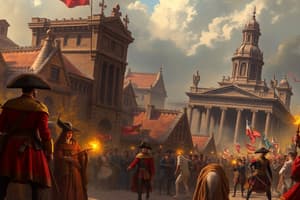Podcast
Questions and Answers
Which of the following best describes the composition of the Third Estate in pre-revolutionary France?
Which of the following best describes the composition of the Third Estate in pre-revolutionary France?
- Exclusively comprised of wealthy merchants and industrialists.
- Primarily consisted of the nobility seeking to advise the King.
- Included the vast majority of the population, such as peasants and commoners. (correct)
- Represented only the high-ranking members of the Catholic clergy.
How did the French people's financial burden contribute to the French Revolution?
How did the French people's financial burden contribute to the French Revolution?
- By encouraging people to support the King, who was seen as their protector against the nobility.
- By creating widespread dissatisfaction and demands for reforms and fair treatment among the common people. (correct)
- By enabling the Third Estate to fund a larger army than the other estates, leading to rapid victory.
- By leading the clergy and nobility to increase spending on public works, reducing unemployment.
What was the primary purpose of convening the Estates General in 1789?
What was the primary purpose of convening the Estates General in 1789?
- To plan military campaigns against neighboring countries.
- To address the economic crisis in France. (correct)
- To formally declare war on Britain.
- To celebrate the King's birthday with representatives from each estate.
During the French Revolution, which group seized power and instituted the Reign of Terror?
During the French Revolution, which group seized power and instituted the Reign of Terror?
Why was King Louis XVI executed during the French Revolution?
Why was King Louis XVI executed during the French Revolution?
Which of the following statements best reflects the living conditions in pre-revolutionary France?
Which of the following statements best reflects the living conditions in pre-revolutionary France?
Which of the following was not a consequence of the French Revolution?
Which of the following was not a consequence of the French Revolution?
How did the French Revolution influence other parts of the world?
How did the French Revolution influence other parts of the world?
Flashcards
Three Estates
Three Estates
The social classes in pre-revolutionary France: clergy, nobility, and commoners.
Taille
Taille
A land tax in France that burdened the common people.
Estates General
Estates General
A representative assembly of the three estates convened in 1789.
Reign of Terror
Reign of Terror
Signup and view all the flashcards
Execution of King Louis XVI
Execution of King Louis XVI
Signup and view all the flashcards
Living Conditions Pre-Revolution
Living Conditions Pre-Revolution
Signup and view all the flashcards
Consequences of the Revolution
Consequences of the Revolution
Signup and view all the flashcards
Liberty, Equality, Fraternity
Liberty, Equality, Fraternity
Signup and view all the flashcards
Study Notes
French Revolution: Causes, Events, and Consequences
- The French Revolution was a period of significant social and political change in France
- It involved a challenge to the existing order, aiming for a more just society
- The French society was divided into three estates: the clergy (First Estate), the nobility (Second Estate), and the common people (Third Estate).
- The First Estate consisted of the clergy
- The Second Estate consisted of the nobility
- The Third Estate consisted of peasants and commoners
- The common people faced heavy taxation, including the land tax (Taille), and growing dissatisfaction
Taxation and Unrest
- The land tax (Taille) added financial strain on the Third Estate
- Growing discontent among the common people demanded reform and fairer treatment
Estates General
- The Estates General was a representative body of all three estates
- It was convened by King Louis XVI in 1789 to address the economic crisis
- The Estates General was established to represent all the different estates in France for decision-making
Causes of the Revolution
- Poor Harvests and Rising Prices: Bad harvests led to food shortages and high bread prices, causing widespread hardship
- Desire for Social Change: The common people (Third Estate) desired greater equality and an end to the privileges of the nobility and clergy.
Execution of King Louis XVI
- King Louis XVI was executed in January 1793 for treason, following an attempted escape and efforts to regain power
- Executed by the National Assembly.
Living Conditions Before the Revolution
- The pre-revolutionary French society was marked by disparities among the estates
- Clergy and nobility had privileges and exemption from taxation
- Common people faced significant financial burdens.
Reign of Terror
- The Jacobins, a radical group, seized power, leading to a violent period
- Those who opposed the revolution faced severe punishment.
Consequences of the Revolution
- The French Revolution led to far-reaching consequences
- The monarchy was abolished
- The principles of liberty, equality, and fraternity became central to the nation
Studying That Suits You
Use AI to generate personalized quizzes and flashcards to suit your learning preferences.
Related Documents
Description
Explore the French Revolution, a period of significant social and political change in France. Examine the causes, including societal divisions into three estates and heavy taxation on the Third Estate. Understand the growing discontent and demands for reform that led to the Estates General.




